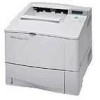HP 4100n HP LaserJet 4100 Series - User Guide - Page 201
Card stock construction, Card stock guidelines, Smoothness, Construction, Condition, Sizes
 |
View all HP 4100n manuals
Add to My Manuals
Save this manual to your list of manuals |
Page 201 highlights
Card stock construction q Smoothness: Card stock should have smoothness in the range of 100 to 180 Sheffield. q Construction: Card stock should lie flat with less than 5 mm (0.2 in) of curl. It should be short grain paper to improve feeding and reduce wear on the printer. q Condition: Make sure card stock is not wrinkled, nicked, or otherwise damaged. q Sizes: Use only card stock within the following size ranges: • minimum: 76 by 127 mm (3 by 5 in) • maximum: 216 by 356 mm (8.5 by 14 in) Before loading card stock in tray 1, make sure it is regular in shape and not damaged. Also, make sure the cards are not stuck together. Card stock guidelines q If cards curl or jam, try printing from tray 1 and opening the rear output bin. q Set margins at least 6 mm (0.24 in) away from the edges of the paper. EN Paper specifications 199















